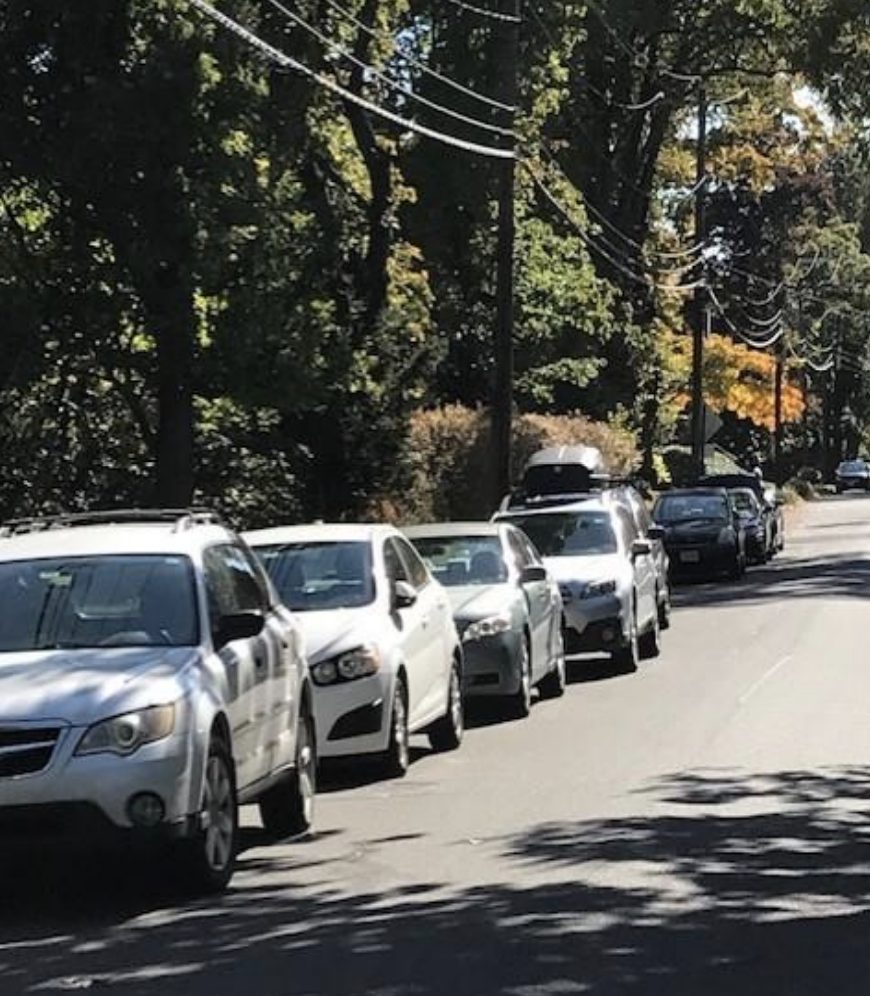Opinion: Parking Wars: Out-of-State Plates and Amherst’s Identity Crisis

Commuter parking congestion on Lincoln Avenue. Photo: Jennifer Taub

Walk down Fearing Street on a Friday night and you’ll see it: cars jammed into driveways, spilling onto sidewalks, littering curbs like confetti after a parade. Out-of-state plates dominate — New Jersey, Connecticut, New York — each one a reminder that Amherst’s streets have become overflow lots for UMass.
Residents complain. Councillors nod. Developers shrug. Meanwhile, those of us who live here year-round circle the block like it’s a mall parking lot on Christmas Eve.
One proposal gaining traction: limit parking and tax out-of-state cars. The logic is seductive. Students bring their cars, clog our streets, and contribute to congestion. A $300 annual fee discourages the extra vehicles, reduces traffic, and — best of all — funnels revenue back into town infrastructure. Landlords who pack in student tenants but offer no parking suddenly can’t freeload on the backs of permanent residents. Bonus points if fewer cars means lower carbon emissions, especially if paired with expanded PVTA routes and safer bike lanes.
But here’s the rub: policy is never clean. Enforcement is messy. Out-of-state plates don’t always belong to students — sometimes it’s visiting family or a cousin borrowing the driveway for the weekend. And what about equity? Wealthier students living in luxury apartments can skip cars and Uber everywhere. It’s the lower-income students — the ones driving old hand-me-downs from home who feel the squeeze. And landlords? They’re not eating the cost. They’ll just pass it on in rent.
Take Emily, a student from New Jersey. She drives a 2008 Honda Civic because it’s cheaper than Ubering everywhere. She’s taxed $300. She fumes. Her wealthy classmates living in Fieldstone apartments don’t pay a dime, even though their presence drives up rents more than her old car ever could. Meanwhile, her landlord pockets the same rent and offers zero parking solutions.
So yes, parking limits and car taxes could bring relief and also spark resentment, create legal headaches, and punish the very students least able to absorb the costs.
Amherst’s eternal dilemma: every “solution” for congestion, housing, or healthcare exposes deeper contradictions. State mandates, developer profits, student realities, resident frustrations collide on our streets, our zoning maps, and, yes, our parking lots.
We can’t Uber our way out of this. If Amherst truly wants to reduce congestion and emissions while protecting residents, it has to think bigger: invest in transit, push UMass to house more students, and design policies that don’t scapegoat the easiest targets.
Because in the end, parking isn’t just about cars. It’s about who gets to move freely in Amherst and who gets stuck circling, waiting for a space that may never open up.
Rizwana Khan is a resident of Amherst and a member of the town’s Human Rights Commission.

There absolutely needs to be some work to reduce the volume of student cars associated with UMass for both parking and traffic reasons. There are far too many college age drivers going over the speed limit and driving carelessly around town.
I would contend most of these students have cars for the luxury of it , we need to find ways to increase PVTA capacity and routes to make that less of a choice. I understand a lot of this is out of state transportation to and from UMass, I’d prefer these cars parked to students in a rush driving around.
Most states now use license plate recognition to charge tolls on their highways. An extension of that system could be used to charge impermanent residents for bringing cars to Amherst. Amherst already knows the license plate numbers of cars that pay excise tax. Commuters to work in Amherst could get a pass. Scans over time would show cars regularly parked that are not registered to an Amherst resident and bills would be sent through the same billing procedure as highway tolls. The Commonwealth could provide park and ride lots with free shuttles to Amherst for those who want to avoid in in-town parking fee.
UMASS student population increased significantly over the past 20 years. Your only solution would be to ban automobiles, so good luck. Back in the bad/good old days cars were not as readily available.
…and were not allowed to students who were not commuters “from their legal” address (most often mom and dad’s house). So, of course, no out of state registered vehicles.
And here we are with a free bus service that may have its routes extended.
That UMass began to allow underclassmen to live off campus shifted its burden to house them on to Amherst and our neighbors. Coincidence? Not!
The bus service was started in the beginning in order to bring students to the then newly built apartment complexes in Sunderland, Belchertown and East Hadley Rd.
Amherst already has a mechanism to manage the private property rental part of this situation. Go to amherstma.gov and search Residential Rental Permitting – Parking Plans. Every registered rental property is required to submit a parking plan for each property showing and the number of cars allowed and other related aspects. You can lookup any rental in town and view the parking plan.
Enforcing the rules that are already in place for renters and regulating on-street parking of visitors, well, those are separate and related issues. In any case, the rules and plans that are already in place governing rental properties — and the related enforcement of those rules — are tools that the town put in place several years ago that may be able to shed some lights for those who may have questions about particular properties around town.
In Massachusetts for state residence, excise taxes are charged each year based on what the vehicle is worth and where it is “garaged“. This means that only students who have declared legal residence in Amherst can be charged excise taxes that revert to Amherst road and highway budget. During the school year Amherst’s permanent residents account for 19,000 of almost 60,000 people in town using our roads. So in effect Amherst 19,000 residents pay for the upkeep of roads that are used by 50 or 60,000 people, and we are already spending less per capita than any state town on road and highway maintenance.
Amherst should require non-resident students to purchase stickers for parking anywhere in town, just like the university itself charges for students to get a parking space. Surely UMass and Amherst College keep records of students vehicle vehicles. If the town accesses those lists it could require car owners to pay for their stickers.
If we want to reduce car use in Amherst, we need not only good public transit options in the Amherst area, we also need good public transit connections between Amherst and outside world. Regular, reliable, inexpensive rail and bus service works in other “developed” countries: why doesn’t it work here?
The reasons are too complex to put in a short comment. But the short answer is this: if developers want to continue developing Amherst, they must to pay the “big-bucks” needed to develop the missing public transit infrastructure — otherwise, they’re just free-loading on our over-loaded country roads….
Good points John. Auto insurance companies would also likely be interested in obtaining accurate information regarding the garaging of vehicles. That could be another potential tool to get those monies coming to Amherst. Seems like the town might be leaving money on the table. Not sure who would compile that information though.
Conceivably, the town could revise the rental permit to require the make, model, and license plate of each tenant. That could also help with parking enforcement if the town regulators knew which cars went with which rental properties.
in Boston, you had to register your car in your neighborhood to get a parking sticker. and show your registration with your application. could this not be a way to have excise tax come here (or no parking permit?)
Allergra — good thought. I’m not sure if the registration would show the garaging location or if the parking sticker would be contingent on an insurance policy showing the garaging location as Amherst. It might all be connected. I just don’t know. It seems like in 2025 those connections would be possible. But sometimes legacy IT systems in the insurance industry and municipal administrations can be pretty siloed.
Amherst is in a unique position, we have three colleges and quite a few students, I don’t think it should be any surprise that we face unique problems. Something bothers me concerning the way the article is written, the way a license plate is noted that is not a Massachusetts plate makes it sound a scarlet letter and the owner of the vehicle sound suspect. I would say that landlords and those that rent should abide by certain rules. No question about it. They should try, to the best of their ability, to be responsible citizens and/or inhabitants of the town. And the town should make it clear of what we want from both of them. But others that are looking at Amherst, and deciding whether or not they want to live here should do their research first. Amherst may have upsides, but, again, our situation is quite unique. I just seem to “perceive” that individuals bought homes here with certain expectations, and then after the fact complained about some things that can’t necessarily be changed.
Amherst’s roads cost $1 million a mile to repair, and with nearly 40% in poor shape, we can’t keep up or catch up. Thousands of student cars are here 8 months a year but pay excise taxes elsewhere. A joint letter from the UMass Chancellor, Town Manager, and Council could appeal to families, students, and landlords: register cars here, as a first act of loyalty to your alma mater and the town that’s hosted it since Lincoln was president. If too few do the right thing, license‑reading cameras may follow. Explain using known principles of influence and persuasion (youtube.com/watch?v=eCNeOga965U). Better neighborliness than surveillance, at least as a first step.
Most landlords rent to more tenants than allowed . Some tenants are off the books .
The spillover of parking in the streets is partially due to that . This seems to be the norm .